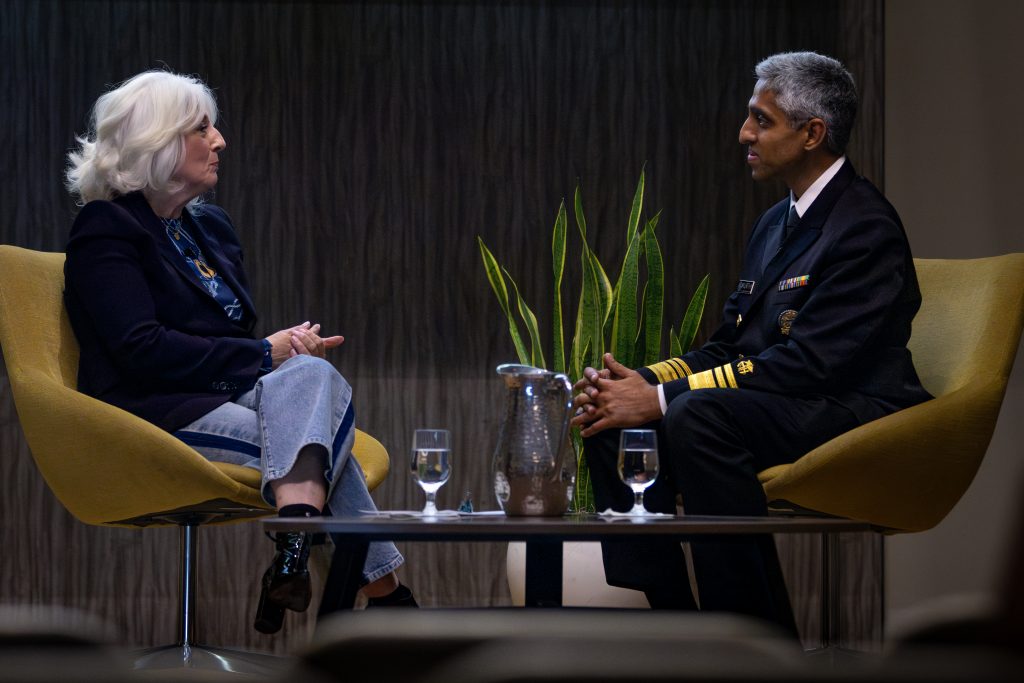
Dr. Vivek Murthy — the United States Surgeon General — spoke to a crowd of Drexel University students and faculty on Nov. 28 about the epidemic of loneliness among college students. His tour of colleges and universities across the U.S. began in late October and concluded after five weeks spent visiting seven locations. The tour’s mission was to raise awareness of young people’s — especially college students’ — mental health struggles and to encourage students to prioritize building valuable, healthy relationships.
Dr. Murthy’s tour included a collaboration with MTV and the nonprofit Active Minds’ Acknowledge, Support and Keep-In-Touch Campaign, which calls on young people to reach out to one another and focus on building a dedicated social support network.
Throughout the day, events and activities at the Creese Center offered members of the Drexel community a place to gather and learn about the mission of the We Are Made To Connect Tour. At 6 p.m., the day’s events culminated with a talk by Dr. Murthy alongside Cynthia Germanotta, Lady Gaga’s mother who co-founded the Born This Way Foundation with her daughter. The Born This Way Foundation supports youth mental health and aims to build a kinder and braver world through research, programs, and partnerships.
Dr. Murthy and Germanotta spoke about the isolation that often leads young students to struggle with forming and maintaining close personal relationships; they also discussed strategies that students can use to develop their connections with others. The final portion of their presentation involved Dr. Murthy issuing his 5-for-5 Connection Challenge — an element of his office’s mission that challenges people to consciously build and strengthen their relationships each day for five days.
Following their talk, the Surgeon General and Germanotta engaged the audience in a Q&A session, during which attendees asked the pair about how they discovered their passion for mental health activism.
Dr. Murthy first decided to tackle mental health in students as an issue after reflecting on the challenges he faced growing up; as he said, “the experiences we have that are difficult as kids sometimes stay with us as adults.”
When he first began as Surgeon General under President Barack Obama, he encountered accounts of mental health issues across the country and realized the majority silently struggled with their challenges. Finally, after witnessing the toll that the COVID-19 pandemic took on our society, he decided to prioritize mental well-being for this term, especially in youth.
“Young people have been particularly hard hit with rising rates of depression, anxiety, and suicide, partly as a result of COVID,” Dr. Murthy explained. He emphasized that young people are our future; their prosperity is crucial for a bright tomorrow.
During his visits to various colleges, Dr. Murthy observed a significant trend: students were more open regarding their experiences with loneliness when in collective settings. Initially, many felt a sense of shame attached to this feeling, but as people came together, a willingness to share emerged. Dr. Murthy noted that when just one person bravely expresses their feelings, it helps dissolve this shame.
“Young people are really invested in wanting to address this issue because they’re living it in real-time,” he said.
He went on to discuss the influence of social media, which has been a point of concern on every campus he has visited. Its impact on students’ mental health, which is almost always negative, poses a significant challenge with no clear resolution in sight.
Dr. Murthy believes we must take urgent action to support youth facing the adverse effects of social media: “it’s stealing time away from in-person interaction, sleep, and other activities that we know young people need in their lives to be healthy.”
If there is one thing Dr. Murthy wants students to take out of his campaign, it is that if you are struggling with loneliness, there is a good chance you are not the only one.
Loneliness is a common struggle, and it’s manageable through “simple acts of connection… checking in on a friend, pausing to talk and say hello to a classmate,” according to Dr. Murthy.
Even if one’s level of comfort with interaction and initiating social contact has diminished after COVID-19, Dr. Murthy wants students to know that’s a muscle they can rebuild, and they can rebuild it with these small acts of connection.


